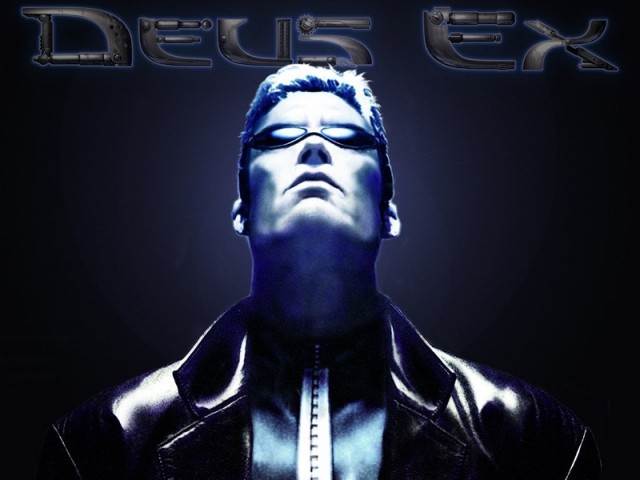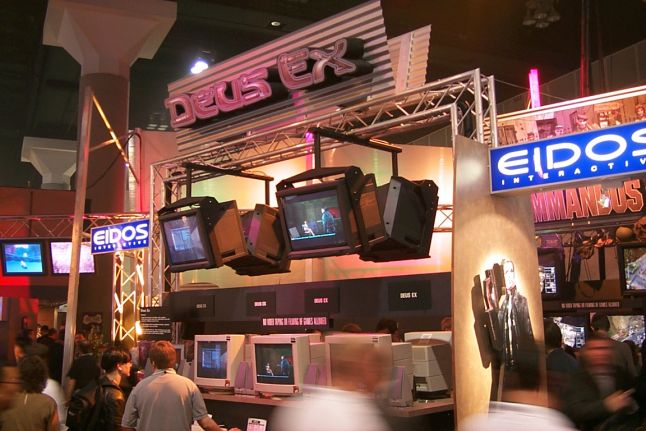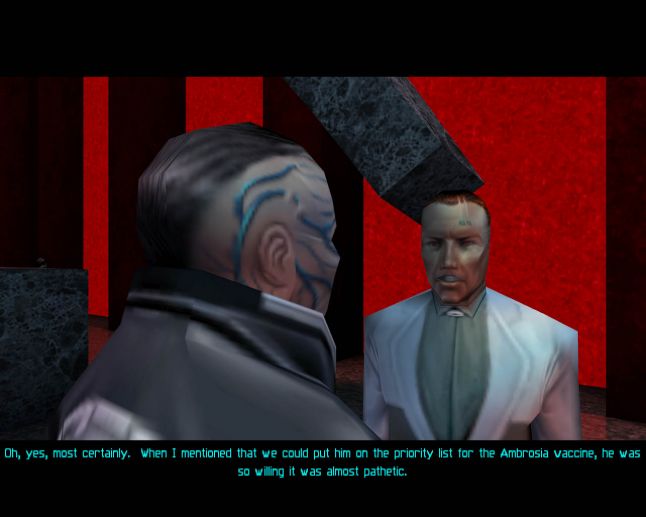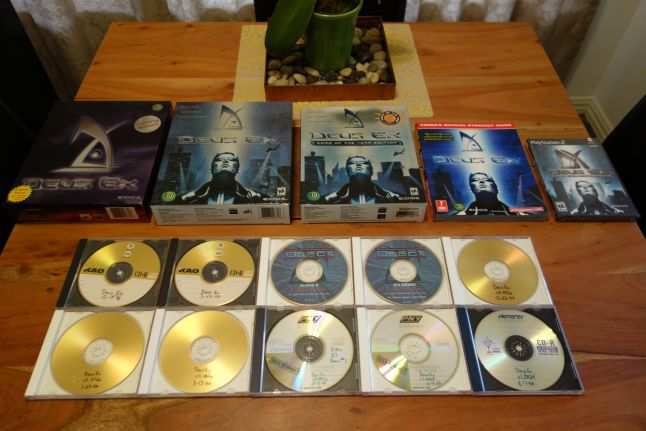History of Deus Ex

Sixteen years ago, the studio Ion Storm Austin released its debut game Deus Ex .
This first-person game in the cyberpunk genre has been warmly received by critics and has become a notable milestone in the career of such game creators as Warren Spector and Harvey Smith. She inspired several generations of developers and designed the “immersion simulator” genre in game design (along with the Looking Glass series of System Shock from Thief: Deadly Shadows, another game by Ion Storm Austin).
However, after the release of the game, lead programmer and assistant director Chris Norden (Chris Norden) told me that most of the developers at Ion Storm Austin did not even suspect that the game would become something more than just one of the quality summer releases.
')
“We did not expect anything special,” Norden, now working for Sony in Japan, told me via Skype. “The game has not been popular for a long time. At first we thought: “yes, it is excellent, and in reviews it is praised; oh well, good. " She became a real hit many years later. Therefore, we had no idea what this would mean. ”
Looking back, one can realize the inevitability of the fact that the works of Ion Storm Austin will lead to the creation of a whole franchise and a huge influence on game designers all over the world. The game influenced designers of such large-scale projects as BioShock and Fallout 3 , as well as more modest games, such as Neon Struct and Catacomb Kids . (This is all described in the Rock Paper Shotgun Deus Ex Made Me series .)
Today, 16 years later, it is time to talk about the founding of Ion Storm Austin and talk about what it was like to work on the first and probably the most influential game. In a series of interviews taken separately from project director Warren Spector, lead programmer and assistant director Chris Norden, composer Alexander Brandon (Alexander Brandon) and lead screenwriter Sheldon Pacotti, we wanted to shed light on the development of this fateful game, to tell about how it reflected the individuality of its creators and influenced their career development.
Below are excerpts from these interviews.
Warren Spector: Without a doubt, the development of Deus Ex was an important event for me. Sometimes our team was like a broken up family, but its attachment to the project brought results. My colleagues worked very hard to unleash the full potential of the game, that's for sure!
We had a very strong feeling that we were doing something special ... unique. Such an opportunity - to create a game of your dreams without interfering with creativity - very rarely appears in life. And I think that everyone, not just me, knew this, so they invested their best.
Sheldon Pakotti: I was completely immersed in the creation of Deus Ex . I lived and breathed Deus Ex for a whole year, seven days a week, fourteen hours a day. So much I was fascinated by the potential of this game. The only thing with which I can compare this is writing a story in which you completely dissolve in an imaginary world and it becomes indistinguishable from reality.
At that time, few expected a video game to reflect reality or tell a story you could believe. Therefore, I was shocked to find a team seeking to make it happen. But I didn't know if the fans would accept it. The biggest reward for me is all the players who continue to play it even today. They, like good participants in the paper role-playing game, plunged into fiction and dissolved into it. This is like a collective hallucination.
Alexander Brandon: Deus Ex is the game I hear about the most. I am proud of all that I worked on. Unreal pushed the boundaries of level design and exploration of fictional worlds in the context of FPS. Unreal Tournament polished multiplayer battles. But Deus Ex destroyed the boundaries between genres, and at that time probably no one did anything like that.
The time spent on the game was incredible. I almost did not fix anything from what I was doing. Of course, I made changes in hindsight, but at that time we all just worked.
Chris Norden: Then we had no idea what this would turn into. Had no clue. We hoped for success, at least among critics, but the game became something ... more.

Part of the Deus Ex development team 16 years ago. Photo courtesy of Chris Norden.
I’ve been working for Sony for almost 10 years; I used to be a public face for developer support, and now I’m connected to PlayStation VR; I often tell developers about PlayStation VR. But now people come to me and ask if I worked on Deus Ex .
We knew what kind of game we wanted to create: it had to have a real choice, and not just a choice of branches of dialogs that didn’t affect anything. We wanted it to be interactive, interesting, with high-quality technology and a powerful storyline.
After the closure of Looking Glass, we hung in the air for six months. We were practically unemployed for about six months, but we had to hold meetings and communicate with publishers. It seems that it took us six months for Ion Storm to accept us, start financing and expand the staff.
Spector: Looking Glass Austin closed mainly because Looking Glass as a whole was in a hopeless financial situation. LG Austin projects could not move on until I found external funding. Despite all the efforts, I did not manage to do this. I talked to the guys from Cambridge, and we all agreed that there was no point in putting the whole organization at risk, trying to keep a separate local office. I was sure that we would find another offer, so we closed.
Even realizing that this was the right decision, I left the empty office for the last time with excruciating pain.
The search for Ion Storm Austin took some time, but I wasn’t very worried. The core of the team was ready to wait for a good deal to turn up. I knew what we wanted to achieve: based on my thoughts, I wrote an article in Game Developer magazine about which direction the RPG should go.
In the end, I was already close to signing an RPG franchise deal for a major publisher, but before I did that, John Romero called me and convinced Ion Storm to open an office for us in Austin and create the game of my dreams, which turned into Deus Ex .
Norden: When we started offering our game to everyone, we heard about Ion Storm, created by John Romero. She was in Dallas, she had a lot of money, and she hired different people to do all sorts of interesting things. The company had what it would call today a critical attitude, it had an attitude “you went, we do what we want.”
You know, we didn’t quite accept such thinking, but we knew that there were good, smart guys working there. We knew what we wanted to do, and it seemed to us the right decision. Especially because we could keep our office in Austin, because none of us wanted to move to Dallas.
Spector: We had annoying disputes with some people (not with John), who thought that I should “just make a shooter”. But I managed to isolate myself from them and, as a result, finish the mix of genres we created.
Yes, this “dream game” approach was very good.
Norden: Warren had a lot of great ideas, we put them together and created a framework for what later became Deus Ex : an action-RPG with freedom of choice, a terrific script that Sheldon wrote, and a pretty powerful engine at the time. We just made interesting decisions, understand? We could do what we wanted and solve problems as we wish.
Pakotti: I clearly remember the design review in the summer of 1999. For the rest of the team, this was an everyday event, but for me it was a terrible moment, because I was a new temporary employee, and there were early parts of my script in the game.
The developer who played the game (Chris Norden) acted like a typical scumbag player: he killed indiscriminately friends and enemies. This led to the fact that Paul Denton, a colleague and brother of the player, told him something like: "You're an idiot!"

Deus Ex demo on E3 in 2000
I cringed because I thought that everyone in the room would find the script immature. However, after a couple of giggles, everyone realized that the game reacted to Chris's style of play. The only thing I heard was the voice of Chris, who whispered something like “Yes, this is cool,” after which he again plunged into the passage. But for me it was an important moment in which I realized that the winding paths of game logic written by me would be appreciated, that I was on the right wave.
Norden: Oh yes, I forgot about that! Everyone was responsible for everything. It was very cool. [Sheldon] is probably the most underrated team member. He has greatly advanced us in the direction he needs. I’m sure I often said no to him, because it was incredibly difficult, but we found ways to do it. We had a whole talk system editor, and he provided us with excellent opportunities in terms of storytelling. Sheldon gave us a good push in this area.
Spector: It was exciting to watch Sheldon Pakotti complement the story with a level of intelligence that still amazes me.
Norden: He himself was almost entirely responsible for the plot, he wrote most of the dialogues. He explained to us what a communication system should be capable of. We realized everything, and it turned out great. We created tools for him to tell his story, and it turned out to be very good. He completely changed everything. Even today, the story remains powerful, and I still have goose bumps on my back when I see the game.

Brandon: I think that the voice of the game was cheap, but it still somehow fulfills its purpose. It gives the game a personality, not in a realistic sense, which is usually implied, but makes the characters more memorable. It seems to me that voices immediately give an idea of which characters really are.
Especially I mean the voices of J.C., Paul, Gunther and Anna Navarre. By the voices of Gunther and Anna it is immediately clear that these are not the people from whom you will be delighted. If you compare with the Invisible War, then it is much less; It's sad to admit, but it seems to me that in the second game one of our goals was to hire quality voice actors and the best voice. [laughs]
We did just that! Strange, but we overdid it, the voices have become too sharp. They destroyed most of the individuality of the characters.
Norden: I implemented one technique, which, I think, no one at that time did. Since there were a lot of dialogues in the game, we wanted to synchronize the lips with the speech of the characters. But there was not the slightest chance that we would find an artist who would do all this manually, because there were too many dialogues. In addition, we must take into account the different languages and localization: it was simply impossible. The artist would have died, unable to cope with this amount of synchronization.
Therefore, I played with mathematics and performed a very simple analysis of the audio using the fast Fourier transform to analyze the sound in real time, and then compared it with the position of the lips, with phonemes.
I know that Valve applied the principle of “repeating the envelope” for the multiplayer mode in Half-Life , but there it is implemented very simply: the louder the sound, the stronger the mouth opens. This is too primitive, I decided that this is not very good. I wanted something more, so I split the sound into phonemes (at least for English).
Fragments of speech sounds, such as "a" or "o", have "fingerprints" of frequencies. Even with a weak processor, I can perform a fast Fourier transform with a low resolution to analyze speech in the process of outputting to a sound card, cut the sound into fragments and try to match them with phonemes. Then I can use this information to prompt the animation system how to move the lips.
Therefore, the artists had to animate the facial bones, which, as I recall, we had only two, with a very small number of polygons. They had to animate poses of faces for only eight phonemes. But they needed to do this for a basic pose, and I mixed up real-time facial animations based on audio.
Then I created the first test level, which was just a huge head in the room. I fed her a bunch of random lines of text, and it was awesome: they fit almost perfectly, and looked really convincing. In addition, everything was done in real time, which to us, I think, no one did.
I think I still have this test room. It works a little faster than necessary and is poorly compatible with modern machines, but I remember showing this first test card to Warren and asking him: “Well, what do you think?” And he is like this: “My God, this is amazing.”

Norden was unable to provide images of this test level with a “huge head in the room”, but he showed us screenshots of the editor of one of the cut out levels of Deus Ex: The White House.
The information reached Dallas, and one of the local chiefs — I will not say who — came to Austin and demanded that I provide him with a technical game engine. We literally got to the cry with him, I said: “No, we developed it here for our game. We will not give it to you so that you will be the first to be released and receive all the glory. ”
But it did not stop him. He demanded: “You must give it to me. I am your boss, you owe. ”
And I refused. Said: "If you want, dismiss me, I will not give you the technology."
Now you can consider it a dirty move, because we were in the same company. But at the same time, I knew this guy’s reputation, and I didn’t want him to steal our glory for the product developed in our office and for our game.
Brandon: We [in Ion Storm Austin] had a lot of smart people. One, in particular, was a rocket builder: Bob White. He had a Ph degree. D. in rocket physics or something like that; after leaving Ion Storm Austin, he began working at Los Alamos. So, we had a lot of smart people, and this also often led to friction.
If people did not agree with each other, it was usually not something simple. They argued about something very difficult that is difficult to explain and communicate. And in this, of course, Ion needed to grow the most. We had capable people who knew what they were doing. But when it came to solving problems ... It was Warren at the time, as far as I know, who was trying to make sure that employees did not quarrel with each other.
Spector: I realized that the team structure I created was fundamentally wrong. I put together a team of those whom I thought were “guys from Ultima ” - designers of traditional RPGs, and “guys from Looking Glass” - designers of simulators with immersion. I thought that I could cope with the tension between the two groups and take the best from them both.
How wrong I was. As a result, we almost started a war in which I was forced to call one team A, and the others - team 1, because otherwise someone would have been B or 2! Then I had to combine both teams under the leadership of one lead designer, Harvey Smith, who followed the Looking Glass approach. In the end, everything worked together, but for some time the situation was very stressful!
Brandon: Not so long ago, Warren and I met at dinner, and the first thing he said was, "Yes, we were then at Ion." He took responsibility for himself. I was pleased to hear this, because I know that I made a lot of mistakes then, but I also learned a lot.
I learned to communicate and build a good team dynamics in the office. With constant work with employees you need to learn to express your opinion correctly, honestly and concisely. For most people (not only in the gaming industry) this is not easy. This is not taught in school. You have to study at work, practicing and gaining experience.
As I recall, we did not have a constantly updated Deus Ex design document. If he was, I never saw him and did not have access to him. In fact, since I came closer to the end of the development, I was assigned mainly to help with the sound of the original Deus Ex for the release of the game.
Here is an example of Brandon's music concept, described as a “demo track for the game by Cliff Bleszinski after Unreal and Unreal Tournament ”, in which there should have been vampires: https://alexanderbrandon.bandcamp.com/track/thecraftsman . The inspiration was the composition of the trailer for the "Dark City". Since the project did not come out after Unreal, the music became the basis for the main theme of Deus Ex .
Therefore, the only thing I was allowed to do was the stories of programmers about how annoying they were to communicate with designers. Especially with some.
There were people in the team who could not say: “Yes, I understood why you think so. I do not think so. I have to make a decision, because I am responsible for this aspect of the game. ”
People had problems even with that! They could not just come in and say: “That’s how I think, and therefore everything should be like this.” You know, at that time only Warren had a great experience, and we were newcomers, so there was a lot of friction.
Spector: We often had fights before knockdowns. I have already spoken about the “design team A” and the “design team 1”, and you can imagine what the level of communication was. But sometimes the situation was tense even between lead designer Harvey Smith and chief programmer and assistant director Chris Norden.
Harvey wanted to grasp the immensity. Chris was mr. No. It was his duty response to any request or question. The funny thing is (I'm not sure if he was aware of this) that every time he said something “no”, it was usually realized within 24 hours.
: , : «. , , . ». Do you understand? : « . . , . ».
«». , - , , , . , : «… , , ...». , .

Deus Ex, E3 -. 1998 .
- , . : « , , ».
… .
: [] , . ! , Deus Ex 1 . , : «, - ».
, , . : « !»
Command and Conquer , , . — , . .
, Deus Ex 1 . , , . .
: , . . , , . , «» . , .
, , . , , … . . .
, , , . , . . . , , . , .
, . , , . , . «, , , . , ! , !»
, , . It's worth it. , , . .
: , . . , !
, DX , . , , , - .
: , . - . , .
Source: https://habr.com/ru/post/398367/
All Articles